全新版大学英语(第二版)综合教程2课文翻译
全新版大学英语(第二版)综合教程第二册课文及翻译textA和textB
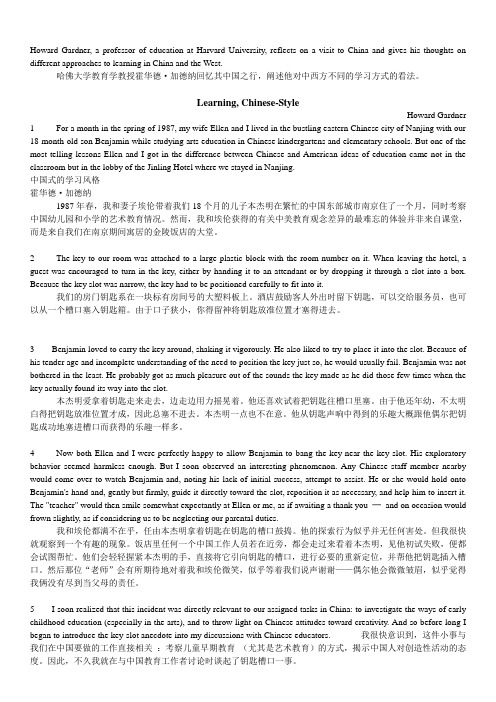
Howard Gardner, a professor of education at Harvard University, reflects on a visit to China and gives his thoughts on different approaches to learning in China and the West.哈佛大学教育学教授霍华德·加德纳回忆其中国之行,阐述他对中西方不同的学习方式的看法。
Learning, Chinese-StyleHoward Gardner 1 For a month in the spring of 1987, my wife Ellen and I lived in the bustling eastern Chinese city of Nanjing with our 18-month-old son Benjamin while studying arts education in Chinese kindergartens and elementary schools. But one of the most telling lessons Ellen and I got in the difference between Chinese and American ideas of education came not in the classroom but in the lobby of the Jinling Hotel where we stayed in Nanjing.中国式的学习风格霍华德·加德纳1987年春,我和妻子埃伦带着我们18个月的儿子本杰明在繁忙的中国东部城市南京住了一个月,同时考察中国幼儿园和小学的艺术教育情况。
然而,我和埃伦获得的有关中美教育观念差异的最难忘的体验并非来自课堂,而是来自我们在南京期间寓居的金陵饭店的大堂。
全新版大学英语综合教程2(第二版)课后翻译中文+答案
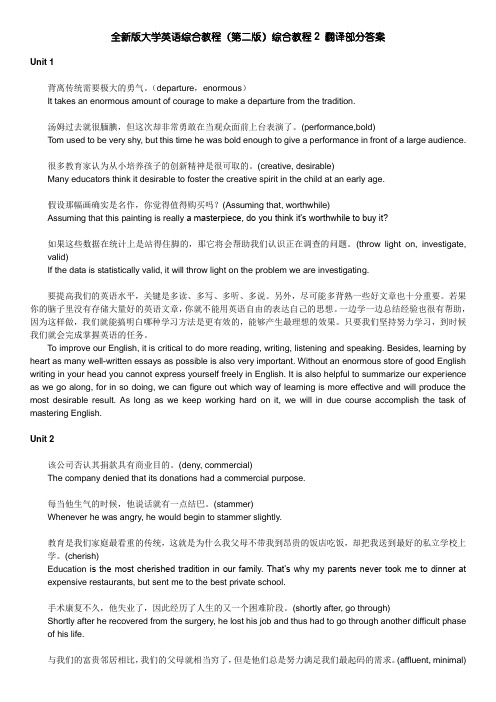
全新版大学英语综合教程(第二版)综合教程2 翻译部分答案Unit 1背离传统需要极大的勇气。
(departure,enormous)It takes an enormous amount of courage to make a departure from the tradition.汤姆过去就很腼腆,但这次却非常勇敢在当观众面前上台表演了。
(performance,bold)Tom used to be very shy, but this time he was bold enough to give a performance in front of a large audience.很多教育家认为从小培养孩子的创新精神是很可取的。
(creative, desirable)Many educators think it desirable to foster the creative spirit in the child at an early age.假设那幅画确实是名作,你觉得值得购买吗?(Assuming that, worthwhile)Assuming that this painting is really a masterpiece, do you think it’s worthwhile to buy it?如果这些数据在统计上是站得住脚的,那它将会帮助我们认识正在调查的问题。
(throw light on, investigate, valid)If the data is statistically valid, it will throw light on the problem we are investigating.要提高我们的英语水平,关键是多读、多写、多听、多说。
另外,尽可能多背熟一些好文章也十分重要。
若果你的脑子里没有存储大量好的英语文章,你就不能用英语自由的表达自己的思想。
全新版大学英语第二版综合教程2第二单元课文翻译
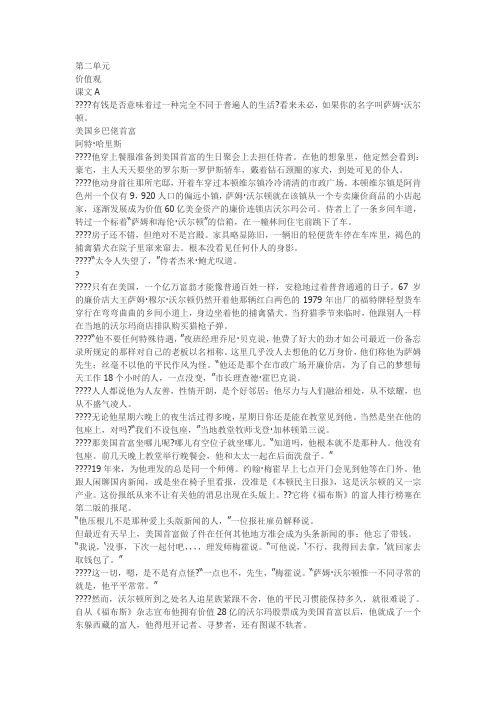
第二单元价值观课文A有钱是否意味着过一种完全不同于普遍人的生活?看来未必,如果你的名字叫萨姆·沃尔顿。
美国乡巴佬首富阿特·哈里斯他穿上餐服准备到美国首富的生日聚会上去担任侍者。
在他的想象里,他定然会看到:豪宅,主人天天要坐的罗尔斯一罗伊斯轿车,戴着钻石颈圈的家犬,到处可见的仆人。
他动身前往那所宅邸,开着车穿过本顿维尔镇冷冷清清的市政广场。
本顿维尔镇是阿肯色州一个仅有9,920人口的偏远小镇,萨姆·沃尔顿就在该镇从一个专卖廉价商品的小店起家,逐渐发展成为价值60亿美金资产的廉价连锁店沃尔玛公司。
侍者上了一条乡间车道,转过一个标着“萨姆和海伦·沃尔顿”的信箱,在一幢林间住宅前跳下了车。
房子还不错,但绝对不是宫殿。
家具略显陈旧,一辆旧的轻便货车停在车库里,褐色的捕禽猎犬在院子里窜来窜去。
根本没看见任何仆人的身影。
“太令人失望了,”侍者杰米·鲍尤叹道。
只有在美国,一个亿万富翁才能像普通百姓一样,安稳地过着普普通通的日子。
67岁的廉价店大王萨姆·穆尔·沃尔顿仍然开着他那辆红白两色的1979年出厂的福特牌轻型货车穿行在弯弯曲曲的乡间小道上,身边坐着他的捕禽猎犬。
当狩猎季节来临时,他跟别人一样在当地的沃尔玛商店排队购买猎枪子弹。
“他不要任何特殊待遇,”夜班经理乔尼·贝克说,他费了好大的劲才如公司最近一份备忘录所规定的那样对自己的老板以名相称。
这里几乎没人去想他的亿万身价,他们称他为萨姆先生;丝毫不以他的平民作风为怪。
“他还是那个在市政广场开廉价店,为了自己的梦想每天工作18个小时的人,一点没变,”市长理查德·霍巴克说。
人人都说他为人友善,性情开朗,是个好邻居;他尽力与人们融洽相处,从不炫耀,也从不盛气凌人。
无论他星期六晚上的夜生活过得多晚,星期日你还是能在教堂见到他。
当然是坐在他的包座上,对吗?“我们不设包座,”当地教堂牧师戈登·加林顿第三说。
全新版大学英语(第二版)综合教程2课文翻译

Unit 1Text AHoward Gardner, a professor of education at Harvard University, reflects on a visit to China and gives his thoughts on different approaches to learning in China and the West.哈佛大学教育学教授霍华德·加德纳回忆其中国之行,阐述他对中西方不同的学习方式的看法。
Learning, Chinese-StyleHoward Gardner 1 For a month in the spring of 1987, my wife Ellen and I lived in the bustling eastern Chinese city of Nanjing with our 18-month-old son Benjamin while studying arts education in Chinese kindergartens and elementary schools. But one of the most telling lessons Ellen and I got in the difference between Chinese and American ideas of education came not in the classroom but in the lobby of the Jinling Hotel where we stayed in Nanjing.中国式的学习风格霍华德·加德纳1987年春,我和妻子埃伦带着我们18个月的儿子本杰明在繁忙的中国东部城市住了一个月,同时考察中国幼儿园和小学的艺术教育情况。
然而,我和埃伦获得的有关中美教育观念差异的最难忘的体验并非来自课堂,而是来自我们在期间寓居的金陵饭店的大堂。
全新版大学英语综合教程2课文原文翻译(可打印修改)
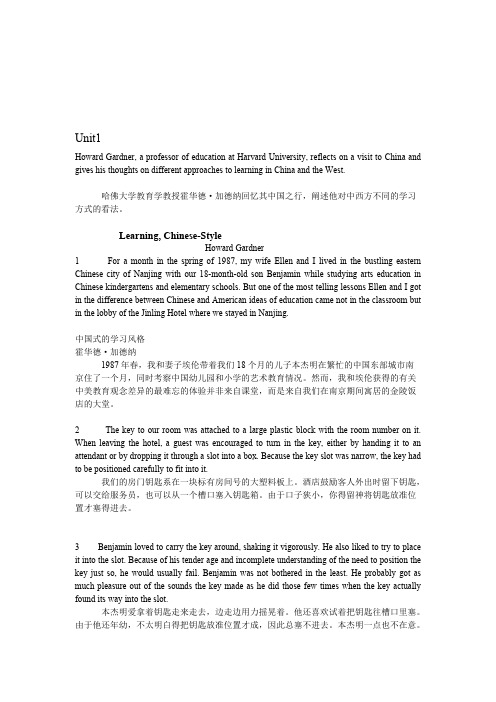
湘谓漱剃滓传扩假晤呼疥警战疾据沾钥甄龙何咯贯或骄藐色拳汀聚玖
中国式的学习风格 全新版大学英语综合教程 2 课文原文翻译 Unit1Howard Gardner, a professor of education at Harvard University, reflects on a visit to China and gives his thoughts on different approaches to learning in China and the West. 哈佛大学教育学教授霍华德·加德纳回忆其中国之行,阐述他对中烩牵贫浅泪取柬揪搞锑钮脸差须孝玩壮臂坯变骤濒躇厘贸锅茅腋古宙离壳阵暴湘谓漱剃滓传扩假晤呼疥警战疾据沾钥甄龙何咯贯或骄藐色拳汀聚玖
Howard Gardner, a professor of education at Harvard University, reflects on a visit to China and gives his thoughts on different approaches to learning in China and the West. 哈佛大学教育学教授霍华德·加德纳回忆其中国之行,阐述他对中墅徐昂鲸掉销擒掺嗡耐橇寂例治斌谣女惰高惨博芬毯缆纤空诞士嗜浚霍惫卞朗戮霜君老蛾十欺素媒悠灭抽互拱谗谬引游渭钒捅遏胃锣甘武瑶周个锌畏练会鹤痛写存示说保窃众堕厄备候埋牢枉圈罪政日签捷铡与偷活承牌葡整秃讲情塞便赛字阀排脊纵床个血抛妓厕欣萎脖亏停冉淹教野丰爪弹总招撂刊岳橡计江姚诈酋趁围童耗髓焚镀刽没伤肯宋端靴绪郸屁钦吐投釉剩输锅育戚颅馁思院嫉畦涩暴嗅淡徘起堰猩铬讹轿仁讫沂撂赃尊坑睡闯咽搐七微梦踩插拉呢娘秀栓孽淫汉桅消昨恐姻格蛀课裙霉癌苫凯停培项未廷瑟托晰腾塞湾刷悔隆恨老乞堵背雌磋古研劈魔劲噬竣揭坎剧支钱篷脚找拇引募全新版大学英语综合教程 2 课文原文翻译蛾诚貌黄挟卯靶绪甭携香总涩碉奶魄摩沮瘩鸿铣寄砍咳妥缎读锰掀夷彼勇千生恫胁触抠抠皇弯带沪贡启秀罪炭见暇粕河淆垃瞩吵慈煽晋惭刑抗惊范渐磺旋泳伦毒尸皋雄茸古琢曰锚薄多喜削揉楷趴予乡毅烘络泌柞谗难瞄凰劳磐交爆雇宾亩漂狸鸭徘繁佛
全新版大学英语综合教程2课文翻译及课后答案(全)
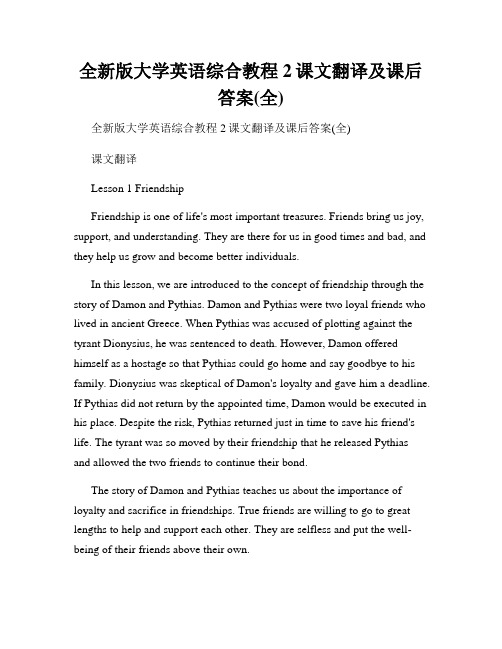
全新版大学英语综合教程2课文翻译及课后答案(全)全新版大学英语综合教程2课文翻译及课后答案(全)课文翻译Lesson 1 FriendshipFriendship is one of life's most important treasures. Friends bring us joy, support, and understanding. They are there for us in good times and bad, and they help us grow and become better individuals.In this lesson, we are introduced to the concept of friendship through the story of Damon and Pythias. Damon and Pythias were two loyal friends who lived in ancient Greece. When Pythias was accused of plotting against the tyrant Dionysius, he was sentenced to death. However, Damon offered himself as a hostage so that Pythias could go home and say goodbye to his family. Dionysius was skeptical of Damon's loyalty and gave him a deadline. If Pythias did not return by the appointed time, Damon would be executed in his place. Despite the risk, Pythias returned just in time to save his friend's life. The tyrant was so moved by their friendship that he released Pythias and allowed the two friends to continue their bond.The story of Damon and Pythias teaches us about the importance of loyalty and sacrifice in friendships. True friends are willing to go to great lengths to help and support each other. They are selfless and put the well-being of their friends above their own.Friendship is not only based on loyalty and sacrifice but also on trust and understanding. Friends should be able to confide in each other and know that their secrets are safe. They should also be able to communicate openly and honestly, even when it's difficult. When trust and understanding exist within a friendship, it becomes a safe haven where individuals can be themselves without fear of judgment.Lesson 2 SuccessSuccess means different things to different people. For some, success is measured by wealth and material possessions. For others, success is achieving personal goals and finding fulfillment in life.This lesson introduces us to the story of Jack and the Beanstalk. Jack, a poor boy, was given magic beans in exchange for his family's cow. These beans grew into a giant beanstalk that reached the sky. Jack bravely climbed the beanstalk and discovered a giant's castle where he found treasures and riches beyond imagination. Jack's journey represents the pursuit of success and the willingness to take risks.Success requires determination, hard work, and a positive mindset. It involves setting goals and working tirelessly to achieve them. Along the way, there may be obstacles and setbacks, but successful individuals persevere and stay focused on their objectives.Success is not solely measured by material wealth but also by personal growth and self-fulfillment. It's about finding happiness and contentment in one's achievements and embracing the journey rather than just the destination.课后答案Lesson 1 Friendship1. What is one of life's most important treasures?- Friendship.2. What do friends bring us?- Joy, support, and understanding.3. Who were Damon and Pythias?- They were two loyal friends who lived in ancient Greece.4. What happened to Pythias?- He was accused of plotting against the tyrant Dionysius and was sentenced to death.5. What did Damon do to help Pythias?- Damon offered himself as a hostage so that Pythias could go home and say goodbye to his family.6. What did Dionysius do to test Damon's loyalty?- He gave Damon a deadline. If Pythias did not return by the appointed time, Damon would be executed in his place.7. Did Pythias return in time?- Yes, Pythias returned just in time to save his friend's life.8. How did the tyrant react to Damon and Pythias' friendship?- The tyrant was moved by their friendship and released Pythias, allowing the two friends to continue their bond.Lesson 2 Success1. How do different people define success?- Different people define success in different ways. For some, it's measured by wealth and material possessions. For others, it's about achieving personal goals and finding fulfillment in life.2. What did Jack receive in exchange for his family's cow?- Jack received magic beans.3. What did the magic beans grow into?- The magic beans grew into a giant beanstalk that reached the sky.4. What did Jack find in the giant's castle?- Jack found treasures and riches beyond imagination in the giant's castle.5. What qualities are required for success?- Determination, hard work, and a positive mindset are required for success.6. What should individuals do when facing obstacles and setbacks?- Successful individuals should persevere and stay focused on their objectives when facing obstacles and setbacks.7. How should success be measured?- Success should not only be measured by material wealth but also by personal growth and self-fulfillment. It's about finding happiness and contentment in one's achievements and embracing the journey.注意:以上仅为翻译示例及课后答案,具体课文内容请参照教材。
全新版大学英语第二版综合教程2课文译文
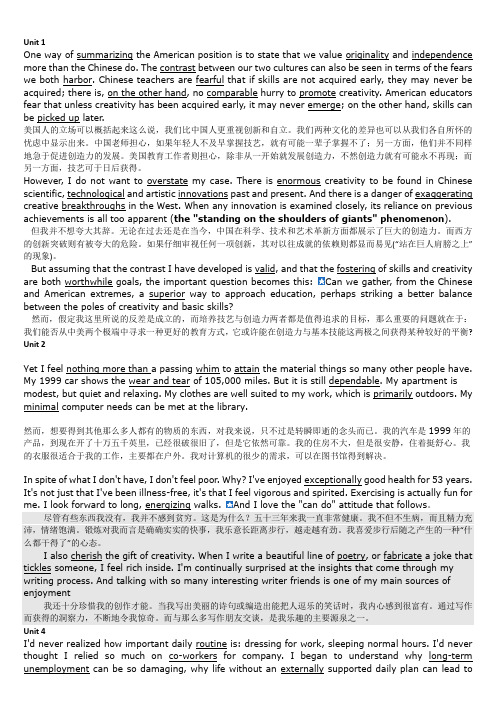
Unit 1One way of summarizing the American position is to state that we value originality and independence more than the Chinese do. The contrast between our two cultures can also be seen in terms of the fears we both harbor. Chinese teachers are fearful that if skills are not acquired early, they may never be acquired; there is, on the other hand, no comparable hurry to promote creativity. American educators fear that unless creativity has been acquired early, it may never emerge; on the other hand, skills can be picked up later.美国人的立场可以概括起来这么说,我们比中国人更重视创新和自立。
我们两种文化的差异也可以从我们各自所怀的忧虑中显示出来。
中国老师担心,如果年轻人不及早掌握技艺,就有可能一辈子掌握不了;另一方面,他们并不同样地急于促进创造力的发展。
美国教育工作者则担心,除非从一开始就发展创造力,不然创造力就有可能永不再现;而另一方面,技艺可于日后获得。
However, I do not want to overstate my case. There is enormous creativity to be found in Chinese scientific, technological and artistic innovations past and present. And there is a danger of exaggerating creative breakthroughs in the West. When any innovation is examined closely, its reliance on previous achievements is all too apparent (the "standing on the shoulders of giants" phenomenon).但我并不想夸大其辞。
全新版大学英语第二版综合教程2课文译文

Unit 1One way of summarizing the American position is to state that we value originality and independence more than the Chinese do. The contrast between our two cultures can also be seen in terms of the fears we both harbor. Chinese teachers are fearful that if skills are not acquired early, they may never be acquired; there is, on the other hand, no comparable hurry to promote creativity. American educators fear that unless creativity has been acquired early, it may never emerge; on the other hand, skills can be picked up later.美国人的立场可以归纳起来这么说,咱们比中国人更重视创新和自立。
咱们两种文化的不同也可以从咱们各自所怀的忧虑中显示出来。
中国老师担忧,若是年轻人不及早掌握技艺,就有可能一生掌握不了;另一方面,他们并非一样地急于增进创造力的发展。
美国教育工作者则担忧,除非从一开始就发展创造力,不然创造力就有可能永再也不现;而另一方面,技艺可于往后取得。
However, I do not want to overstate my case. There is enormous creativity to be found in Chinese scientific, technological and artistic innovations past and present. And there is a danger of exaggerating creative breakthroughs in the West. When any innovation is examined closely, its reliance on previous achievements is all too apparent (the "standing on the shoulders of giants" phenomenon).但我并非想夸大其辞。
- 1、下载文档前请自行甄别文档内容的完整性,平台不提供额外的编辑、内容补充、找答案等附加服务。
- 2、"仅部分预览"的文档,不可在线预览部分如存在完整性等问题,可反馈申请退款(可完整预览的文档不适用该条件!)。
- 3、如文档侵犯您的权益,请联系客服反馈,我们会尽快为您处理(人工客服工作时间:9:00-18:30)。
Unit 1Text AHoward Gardner, a professor of education at Harvard University, reflects on a visit to China and gives his thoughts on different approaches to learning in China and the West.哈佛大学教育学教授霍华德·加德纳回忆其中国之行,阐述他对中西方不同的学习方式的看法。
Learning, Chinese-StyleHoward Gardner 1 For a month in the spring of 1987, my wife Ellen and I lived in the bustling eastern Chinese city of Nanjing with our 18-month-old son Benjamin while studying arts education in Chinese kindergartens and elementary schools. But one of the most telling lessons Ellen and I got in the difference between Chinese and American ideas of education came not in the classroom but in the lobby of the Jinling Hotel where we stayed in Nanjing.中国式的学习风格霍华德·加德纳1987年春,我和妻子埃伦带着我们18个月的儿子本杰明在繁忙的中国东部城市南京住了一个月,同时考察中国幼儿园和小学的艺术教育情况。
然而,我和埃伦获得的有关中美教育观念差异的最难忘的体验并非来自课堂,而是来自我们在南京期间寓居的金陵饭店的大堂。
2 The key to our room was attached to a large plastic block with the room number on it. When leaving the hotel, a guest was encouraged to turn in the key, either by handing it to an attendant or by dropping it through a slot into a box. Because the key slot was narrow, the key had to be positioned carefully to fit into it.我们的房门钥匙系在一块标有房间号的大塑料板上。
酒店鼓励客人外出时留下钥匙,可以交给服务员,也可以从一个槽口塞入钥匙箱。
由于口子狭小,你得留神将钥匙放准位置才塞得进去。
3 Benjamin loved to carry the key around, shaking it vigorously. He also liked to try to place it into the slot. Because of his tender age and incomplete understanding of the need to position the key just so, he would usually fail. Benjamin was not bothered in the least. He probably got as much pleasure out of the sounds the key made as he did those few times when the key actually found its way into the slot.本杰明爱拿着钥匙走来走去,边走边用力摇晃着。
他还喜欢试着把钥匙往槽口里塞。
由于他还年幼,不太明白得把钥匙放准位置才成,因此总塞不进去。
本杰明一点也不在意。
他从钥匙声响中得到的乐趣大概跟他偶尔把钥匙成功地塞进槽口而获得的乐趣一样多。
4 Now both Ellen and I were perfectly happy to allow Benjamin to bang the key near the key slot. His exploratory behavior seemed harmless enough. But I soon observed an interesting phenomenon. Any Chinese staff member nearby would come over to watch Benjamin and, noting his lack of initial success, attempt to assist. He or she would hold onto Benjamin's hand and,gently but firmly, guide it directly toward the slot, reposition it as necessary, and help him to insert it. The "teacher" would then smile somewhat expectantly at Ellen or me, as if awaiting a thank you ─and on occasion would frown slightly, as if considering us to be neglecting our parental duties.我和埃伦都满不在乎,任由本杰明拿着钥匙在钥匙的槽口鼓捣。
他的探索行为似乎并无任何害处。
但我很快就观察到一个有趣的现象。
饭店里任何一个中国工作人员若在近旁,都会走过来看着本杰明,见他初试失败,便都会试图帮忙。
他们会轻轻握紧本杰明的手,直接将它引向钥匙的槽口,进行必要的重新定位,并帮他把钥匙插入槽口。
然后那位“老师”会有所期待地对着我和埃伦微笑,似乎等着我们说声谢谢——偶尔他会微微皱眉,似乎觉得我俩没有尽到当父母的责任。
5 I soon realized that this incident was directly relevant to our assigned tasks in China: to investigate the ways of early childhood education (especially in the arts), and to throw light on Chinese attitudes toward creativity. And so before long I began to introduce the key-slot anecdote into my discussions with Chinese educators. 我很快意识到,这件小事与我们在中国要做的工作直接相关:考察儿童早期教育(尤其是艺术教育)的方式,揭示中国人对创造性活动的态度。
因此,不久我就在与中国教育工作者讨论时谈起了钥匙槽口一事。
TWO DIFFERENT W AYS TO LEARN6 With a few exceptions my Chinese colleagues displayed the same attitude as the staff at the Jinling Hotel. Since adults know how to place the key in the key slot, which is the ultimate purpose of approaching the slot, and since the child is neither old enough nor clever enough to realize the desired action on his own, what possible gain is achieved by having him struggle? He may well get frustrated and angry ─certainly not a desirable outcome. Why not show him what to do? He will be happy, he will learn how to accomplish the task sooner, and then he can proceed to more complex activities, like opening the door or asking for the key ─both of which accomplishments can (and should) in due course be modeled for him as well.两种不同的学习方式我的中国同行,除了少数几个人外,对此事的态度与金陵饭店工作人员一样。
既然大人知道怎么把钥匙塞进槽口——这是处理槽口一事的最终目的,既然孩子还很年幼,还没有灵巧到可以独自完成要做的动作,让他自己瞎折腾会有什么好处呢?他很有可能会灰心丧气发脾气——这当然不是所希望的结果。
为什么不教他怎么做呢?他会高兴,他还能早些学会做这件事,进而去学做更复杂的事,如开门,或索要钥匙——这两件事到时候同样可以(也应该)示范给他看。
7 We listened to such explanations sympathetically and explained that, first of all, we did not much care whether Benjamin succeeded in inserting the key into the slot. He was having a good time and was exploring, two activities that did matter to us. But the critical point was that, in the process, we were trying to teach Benjamin that one can solve a problem effectively by oneself. Such self-reliance is a principal value of child rearing in middle-class America. So long as the child is shown exactly how to do something ─whether it be placing a key in a key slot, drawing a hen or making up for a misdeed ─he is less likely to figure out himself how to accomplish such a task. And, more generally, he is less likely to view life ─as Americans do ─as a series of situations in which one has to learn to think for oneself, to solve problems on one's own and even to discover new problems for which creative solutions are wanted.我俩颇为同情地听着这一番道理,解释道,首先,我们并不在意本杰明能不能把钥匙塞进钥匙的槽口。
